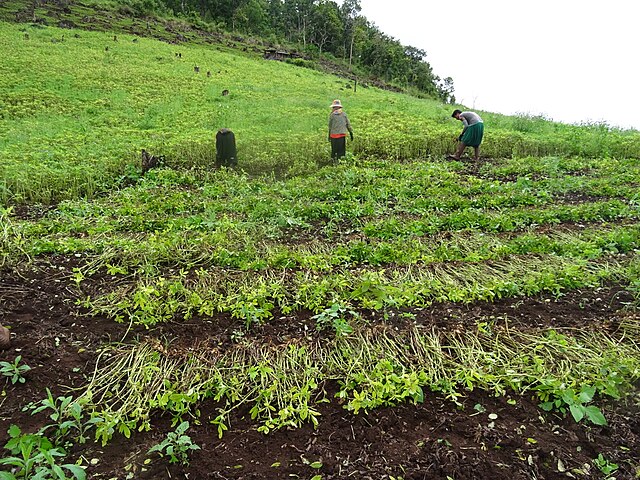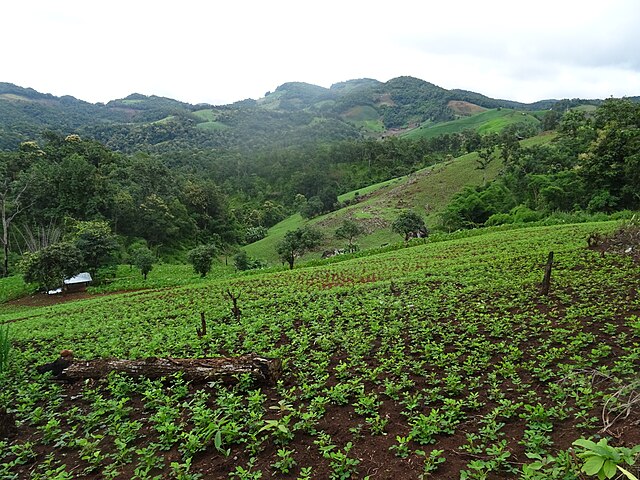
Thammasat University students interested in business, economics, ecology, environmental studies, sociology, political science, ASEAN studies, and related subjects may find it useful to participate in a free 11 April Zoom webinar on Finance, Energy and Food Intersections in Southeast Asia’s Green Transition.
The event, on Tuesday, 11 April 2023 at 2pm Bangkok time, is presented by ISEAS – Yusof Ishak Institute, Singapore.
The TU Library collection includes several books about different aspects of the green economy.
The event webpage explains:
About the Webinar
Public support for a greener economy is gaining momentum in Southeast Asia, and ASEAN has also been collaborating with major powers – such as the U.S., the E.U. and China – to increase green finance and investments in the region. It is undeniable that investments in renewable energy are essential to the promotion of a climate-resilient economy. However, rapid expansions of renewable energy projects have potential adverse effects on food security and people’s livelihoods. This serves as a reminder that, without policy interventions to promote social justice and fairer distribution of economic benefits, green economic transition in Southeast Asia may fail to advance inclusive and sustainable development in the region.
In this webinar, Giulia Dal Maso will discuss Chinese-led green finance along the Belt and Road Initiative and lessons for Southeast Asia. Siwage Negara will discuss the challenges and prospects of energy transition in Indonesia, as well as its potential impacts on the region at large. Prapimphan Chiengkul will then discuss the importance of promoting just transition in the energy and agrifood sectors in Southeast Asia.
About the Speakers
Prapimphan Chiengkul is an Assistant Professor at the Faculty of Political Science, Thammasat University in Thailand, Associate Fellow with the Climate Change in Southeast Asia Programme, ISEAS-Yusof Ishak Institute in Singapore, and Honorary Research Fellow at the Centre for the Study of Globalisation and Regionalisation at the University of Warwick in the UK. She specialises in the political economy of development and is currently conducting research into the connections between climate change and just energy-food transition in Southeast Asia. She has published two books with Routledge and Palgrave as well as research articles in Third World Quarterly and Alternatives: Global, Local, Political.
Giulia Dal Maso is a Marie Skłodowska-Curie Fellow at the Department of Asian and North African Studies, Ca’ Foscari University of Venice and at the Asia Research Institute, National University of Singapore. […]
Siwage Dharma Negara is a senior fellow at the ISEAS- Yusof Ishak Institute (ISEAS). He is Co-Coordinator for the Indonesia Studies Programme and Coordinator for the Singapore APEC Study Centre at the institute. […]
The TU Library collection includes books with published research by Ajarn Prapimphan.
Students are invited to register for the event at this link:
https://us06web.zoom.us/webinar/register/WN__kO4OFCKSvq71O335M6uHw#/registration

In March 2023, the Economic and Social Commission for Asia and the Pacific (ESCAP) published in collaboration with the Asian Development Bank (ADB) and United Nations Development Programme (UNDP) Delivering on the Sustainable Development Goals through Solutions at the Energy, Food and Finance Nexus: 2023 Asia-Pacific SDG Partnership Report.
Avaailable for free download, the report notes:
SDG stocktaking in times of compounding crises: new shocks and stresses from energy, food and finance
The polycrisis has severely disrupted energy, food and finance systems in the region and set in motion new shocks and stresses that are especially devastating for the most vulnerable groups. The crisis is plunging millions more people into poverty and setting back the progress towards the SDGs even further. This situation threatens to slow down the post-COVID-19 transition towards a greener, more inclusive economy and society. Disasters triggered by natural hazards, an acute climate crisis, and political and economic turmoil have further hampered progress towards sustainable development in the region. Asia and the Pacific is at a crossroads, with a series of overlapping crises exposing vulnerabilities in the critical interlinked systems of energy, food and finance and potentially undermining longer-term sustainable development. In the polycrisis, however, also lies hope and opportunity for change. It can be seen as an important turning point towards a cleaner and more secure future, initiating renewed momentum to transform energy and food systems. Recovering from the polycrisis will require countries to address these immediate vulnerabilities whilst not losing track of longer-term development objectives. Without substantial progress on climate change mitigation in line with international agreements, climate-related disasters will become more frequent and extreme. Preparing the Asia-Pacific region to navigate ongoing and future crises will require coordinated and inclusive transformations of the energy, food, and finance systems at regional, subregional, national and local levels.
Energy, food and financing solutions for the SDGs Innovation—including through new technologies, business models, policy frameworks, and social advances—in energy and food production offers sustainable and cost-effective solutions to meet energy and food needs and ensure a more equitable distribution to the marginalized and vulnerable people in the region. The region is witnessing promising practices on smart and low-carbon farming and technological advances that are accessible to all and offer the opportunity to optimize the use of inputs, raise agricultural yields and reduce environmental impact. Emerging approaches to making energy and food systems more efficient and less wasteful, along with the promotion of sustainable consumption, can further reduce environmental degradation and benefit both farmers and consumers. Replicating and scaling up existing innovations and solutions will promote more sustainable and inclusive energy and food systems, capitalizing on opportunities to overcome the polycrisis and advance the SDGs. […]
The polycrisis calls for multinational and multisectoral responses to address the stalling of progress on SDGs and build back better. Strengthening regional and subregional partnerships across the energy-food-finance nexus is vital to help countries become more resilient in the face of current and future shocks. National strategies that make use of cross-sector and crossagency collaborations can foster coherent and cohesive policy solutions. Data-driven and adaptive institutions can enable countries in Asia and the Pacific to better respond to crises and build resilience of the energy, food and finance systems over the medium to long term. New technologies, when well designed and implemented, present an extraordinary opportunity to shape more effective public policy and private sector solutions across the three systems. Applying agile governance and participatory scenario planning can enable national institutions to adapt to changing circumstances through more responsive policymaking. Financing robust, inclusive and adaptive social protection systems is critical to address multidimensional risks and improve the energy and food security of vulnerable groups in the face of the recent crises, promoting long-term resilience. Encouraging private enterprises to use SDG impact frameworks and develop bankable projects for SDG-aligned financing will help channel more capital towards the 2030 Agenda for Sustainable Development. It is therefore crucial to ensure financial market regulators are well placed to manage climate change risks and smooth the low-carbon transition. Recalibrating public financial management is vital to protecting fiscal space and boosting public investment towards the SDGs amid worsening fiscal conditions. Good practices from countries in the region indicate the need to integrate SDGs in the budgeting process, explore new approaches to revenue mobilisation and reform wasteful agricultural, food and fossil fuel subsidies. Scaling up private sector investment would accelerate the transition to sustainable energy and food systems. Broad opportunities exist for stakeholders to explore innovative financial solutions towards sustainability, including by better linking products to the SDGs to address the energy-food-finance nexus. Regional and subregional initiatives must complement technical and country- or communitylevel interventions. Amid the polycrisis, redoubling commitments to lower trade barriers and support a just energy transition through closer and stronger cooperation will help promote food and energy security.

(All images courtesy of Wikimedia Commons)
